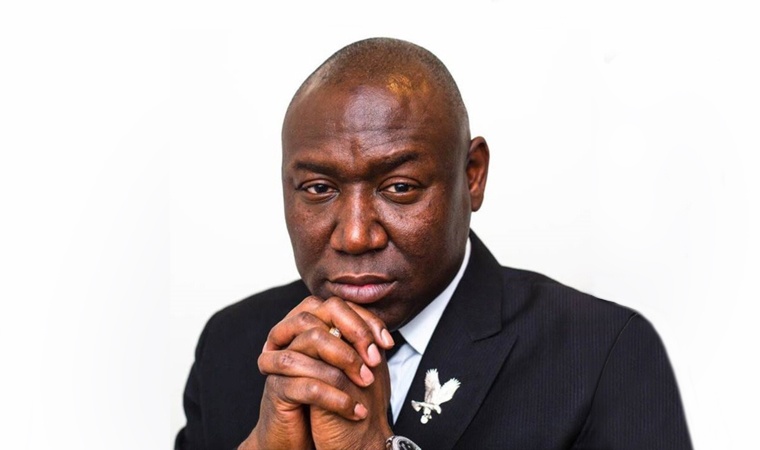Renowned civil rights attorney Benjamin Crump spoke at the second installment of Voices for Justice: Equity & Arts series on March 24, discussing police brutality and the importance of unity during times of oppression.
The virtual event was hosted by the Karen and Richard Carpenter Performing Arts Center.
Crump, who earned the nickname “Black America’s Attorney General,” has taken on high-profile cases, representing the families of Trayvon Martin, Breonna Taylor and George Floyd, advocating and seeking justice against police brutality.
Crump discussed that poor people of color will always face the “most injustice and the least justice,” explaining that society has allowed for people to try and justify discrimination. It’s why coming together is so integral, Crump said, in order to overcome people trying to suppress equality.
He points out that the demographics of those incarcerated in the U.S., large percentages of Black men or people from minority communities, is proof that there is a concerted effort to keep people from having equal opportunities and maintain the status quo.
“There’s no way you can come to that conclusion without understanding that there is an effort by some in our society to have our young people, our children, be targeted for the school to prison pipeline,” Crump said, explaining that the only way to overcome that is to see that children become more intelligent than their oppressors.
Crump said that factor is why he spoke at the virtual event.
“I’m doing this evening because you young people are powerful, you don’t realize yet, your power, but you all will be someone with skill, most intelligent, most articulate, most resourceful, most powerful people in society after you get this great education from California State University,” Crump said. “Never forget that you all will have the power in your hands to make this world a better place for all of our children.”
The importance of building support between Black and Brown persons was also brought up, highlighting building advocacy instead of pitting communities against one another.
To do that, Crump said both communities must work to engage with one another, educate one another and once that is accomplished, then both communities can empower each other. It’s also about knowing that by coming together, we are more powerful, according to Crump.
“We have to always understand what this is about,” Crump said. “This is about uplifting the community, uplifting our people and uplifting the future of our children. We can never ever think it’s just about today, it is always about tomorrow. It is always about giving the next generation a better opportunity at achieving equality.”
But in order to work for tomorrow, it’s also about seizing this time that Crump said he is unsure of if we’ll get again in the U.S., a result of the murder of George Floyd in May 2020 that galvanized people in ways Crump said he hadn’t “seen in his life.”
But something Crump made clear during the event was the problematic language used when describing cases like the murder of George Floyd or Jacob Blake.
Crump said that people often say during these cases is that they are “hard” cases, that it’s going to be a “difficult” case or a “challenging” case, a false narrative that hides the simple facts in many of these cases, that police brutality has led to death.
“It’s only when it’s a Black person been unjustly killed by the police, or a Brown person, they start saying, ‘Oh, it’s such a hard case,’” Crump said. “That is not a hard case. What it underscores is that we have two justice systems in America, one for white America, and one for others.”
Holding police accountable is the best way to see a decrease in brutality against Black and Brown people, according to Crump. It’s the only way to change the mindset police have adopted, where “they know they can shoot first and ask questions later for a Black and Brown person.”
Crump urged attendees at the event to fight for every unknown Black and Brown person who has died due to police brutality, the ones with names only their family say. He also said that in the same way people were outraged by the murder of George Floyd, people should equally be outraged by the murder of Anthony McClain, who was fatally shot by police during a traffic stop in August 2020.
But amid all of this, people have also become increasingly frustrated with allies who give themselves that label but fail to speak up in their positions of power and influence. One attendee asked Crump how to combat this.
“You have to condemn it, and you have to condemn it with your actions, not by just saying it,” Crump said, explaining to engage allies and speak with them. “[Tell them] so won’t you come and help us make a better world together?”
While not everyone has to be on the frontlines, Crump said everyone has a role to play in the case for equality and justice, whether it be through mentorship, community service or anything else.
“When you watch that George Floyd video, you should be compelled to do something, whatever that is, you should do it,” Crump said. “And you should shout it from the mountaintop, that I’m doing this because I believe that humanity and justice should be a birthright for everybody.”
The next installment in the Voices for Justice: Equity & Arts series will take place on April 24, featuring Michael Eric Dyson. Visit the Carpenter Center’s website for more information.




